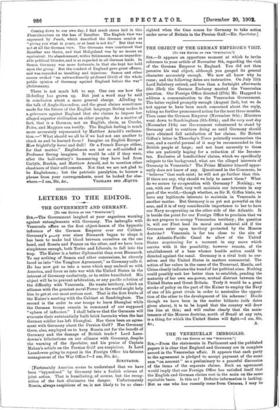THE OBJECT OF THE GERMAN EMPEROR'S VISIT. [To THE EDITOR
OF THE "SPECTATOR."] SIE,—It appears an opportune moment at which to invite reference to your article of November 8th, regarding the visit
of the German Emperor to England. You did not then perceive his real object, although you gauged its general character accurately enough. We now all know why he came; and the following dates are instructive. On July 11th Lord Salisbury retired, and less than a fortnight afterwards (the 23rd) the German Embassy mooted the Venezuelan question. Our Foreign Office directed (27th) Mr. Haggard to address a communication to the Venezuelan Government.
The latter replied promptly enough (August 2nd), but we do not appear to have been much concerned about the reply, taking no further pronounced action for the next three months.
Then came the German Emperor (November 8th) ; Ministers went down to Sandringham (8th-10th) ; and the very next day (November 11th) our Government volunteered to stand by Germany and to continue doing so until Germany should have obtained full satisfaction of her claims. Sir Robert Giffen's letter in Thursday's Times pointedly summarises the case, and a careful perusal of it may be recommended to the British people at large; and not least earnestly to those who are patiently hoping for a reduction of the Income- tax. Exclusive of bondholders' claims, which we specifically relegate to the background, what are the alleged interests of Germany in Venezuela? The Prime Minister himself appar- ently does not know of any. Questioned in the Commons, he " believes " that such exist; he will not go further than this.
If there are any, why should we help to assert them ? What do we secure by co-operation with Germany ? Nothing ; we can, with our Fleet, very well maintain our interests in any part of the world,—though whether, as Sir R. Giffen hints, we have any legitimate interests to maintain in Venezuela is another matter. But Germany is as yet not powerful on the seas, and it is of very considerable importance to her to have our Navy co-operating on the other side of the Atlantic. It is beside the point for our Foreign Office to proclaim that we do not propose to occupy Venezuelan territory; the question is, will our Fleet lend its moral and material aid if the Germans enter upon territory protected by the Monroe doctrine ? Venezuela is far too close to the site of the Atlantic-Pacific Canal to allow of the United States acquiescing for a moment in any move which carries with it the possibility, however remote, of the establishment of a base whence hostile action could be directed against the canal. Germany is a rival both to our- selves and the United States in matters commercial. The action of her rulers in the cases of the Transvaal, Manila, and China clearly indicates the trend of her political aims. Nothing could possibly suit her better than to establish, pending the maturity of her own sea-power, mutual distrust between the United States and Great Britain. Truly it would be a great stroke of policy on the part of the Kaiser to employ the Navy of one of his great rivals in order to neutralise the opposi- tion of the other to the development of his schemes ! Docile
though we have been in the matter hitherto (vide dates given above), it is to be hoped that the country will draw
the line at this; and will realise clearly that the main- tenance of the Monroe doctrine, north of Brazil at any rate, is a thing for which the United States will fight.—I am, Sir,










































 Previous page
Previous page